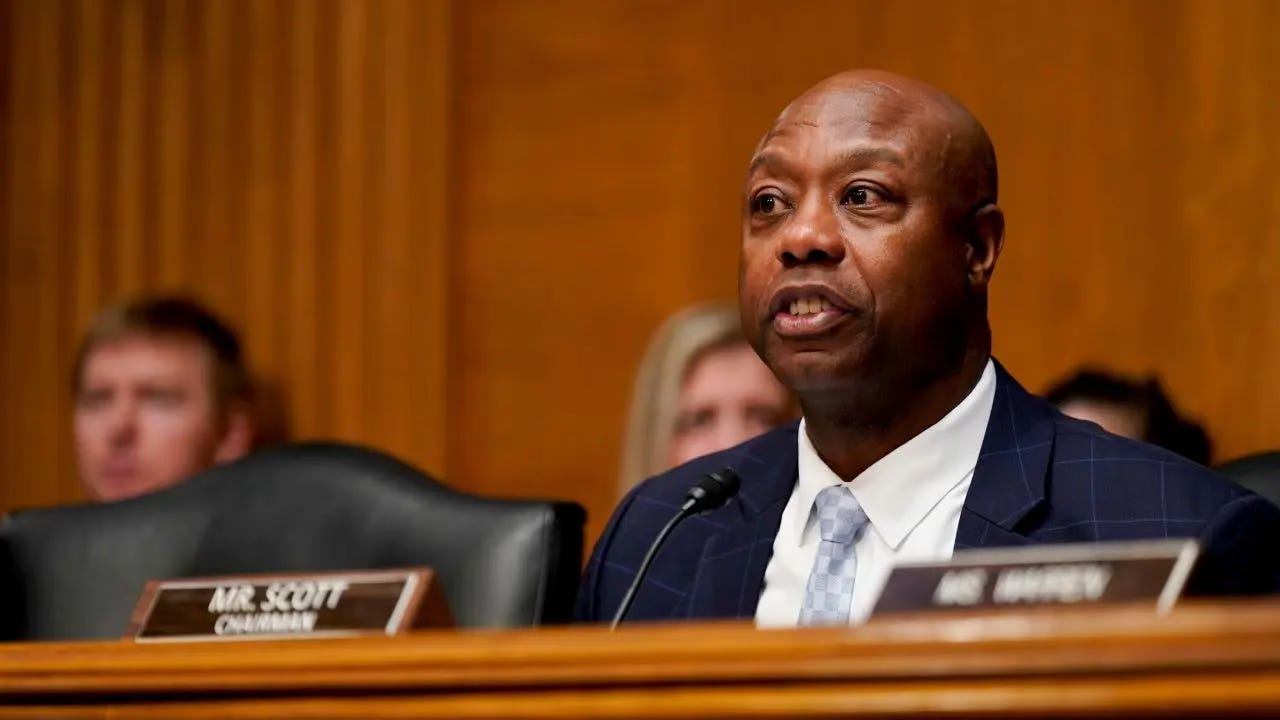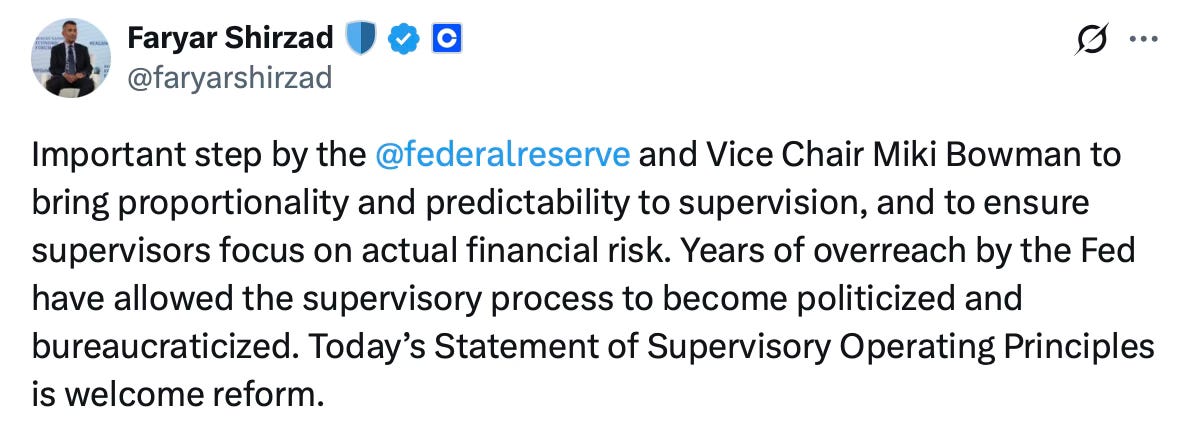Senate Crypto Legislation Inches Forward, Floor Vote Expected Early 2026
Sen. Tim Scott (R-SC) lays out a tentative timeline, signaling bipartisan progress on U.S. crypto market structure reform
Welcome to the Wednesday edition of the Crypto In America newsletter!
What you’ll read: Senate’s timeline for crypto market structure bill in focus, New Hampshire issues first Bitcoin-backed bond, banking regulators are rolling out the crypto clarity, and Bitwise co-founder Hunter Horsley joins the podcast.
Senate Banking Committee Chair Tim Scott (R-SC) dropped some long-awaited clarity on Tuesday morning when he revealed a tentative timeline for advancing crypto market structure reform in the Senate.
“By the end of this year, next month, we believe we can mark up and vote in both committees and get this to the floor of the Senate early next year so that President Trump will sign the legislation making America the crypto capital of the world,” Scott said in a TV interview.
The information was the missing piece for industry players trying to gauge the timing of a bill that will finally set real rules of the road for crypto in the U.S. Until now, Scott had not indicated when his committee might mark up its portion of the bill, which has become a bipartisan product after last month’s industry roundtables on Capitol Hill finally pushed Democrats and Republicans on the Banking Committee to collaborate on what had previously been a GOP-led text.
It’s unclear when we’ll see the revised text from the Banking Committee, but industry sources advising on the process say key sections are still being ironed out. With members leaving for Thanksgiving tomorrow, the draft may not be released until December, possibly right before a markup.
Meanwhile, after the Senate Agriculture Committee released its 155-page bipartisan discussion draft last week, the industry is expected to spend Thanksgiving providing feedback on a text many say is still largely unfinished.
Following Scott’s timeline, both Senate Ag and Banking Committees are slated to hold markups and votes next month, after which their two versions will be merged into a single bill aimed for a Senate floor vote in early 2026.
Once the bill passes the Senate, it will go back to the House for final approval before heading off to President Trump’s desk.
Perhaps predictably, the new timeline drew grumblings online from some industry participants, who noted that Senate leadership, with the White House’s encouragement, had initially aimed to pass the market structure bill and get it signed into law by Christmas.
But a 43-day government shutdown and the realities of bipartisan work in the Senate meant the end-of-year target was always going to be a long shot.
Senate Ag holds hearing on CFTC Chair nominee
Industry will be closely watching CFTC Chair nominee Mike Selig’s hearing before the Senate Ag Committee at 3:00 PM EST today.
Selig, currently Chief Counsel on the SEC Crypto Task Force and Senior Advisor to Chairman Paul Atkins, is the White House’s latest pick to lead the commodities regulator, which is set to play a bigger role in digital asset oversight under Congress’s proposed market structure reforms.
The Ag Committee is expected to vote on Selig’s nomination Thursday afternoon. If it advances, as expected, it will head to the full Senate for a vote.
New Hampshire Launches First Bitcoin-Backed Municipal Bond
New Hampshire just made Bitcoin history — again.
The Granite State approved a $100 million municipal bond backed by Bitcoin, the first of its kind in the U.S., just months after signing a law to establish the nation’s first strategic Bitcoin reserve. The state’s Business Finance Authority acts as a conduit, so the bond isn’t backed by taxpayers. Instead, repayment comes from the borrower, while investors are secured by Bitcoin held with custodian BitGo.
The bond, created by crypto asset manager Wave Digital Assets and muni specialist Rosemawr Management, lets companies borrow against over-collateralized Bitcoin under the same rules as traditional municipal and corporate bonds.
“Our goal is to bridge traditional fixed income with digital assets in a way that’s fully institutional, fully compliant, and globally scalable,” said Les Borsai, co-founder of Wave.
GOP Rep. Keith Ammon, who helped pass New Hampshire’s Strategic Bitcoin Reserve law, called the bond a sandbox to test Bitcoin as high-grade collateral in government finance. Borrowers post 160% of the bond’s value in Bitcoin, with a liquidation mechanism if prices drop.
“This isn’t just one transaction, it’s the opening of a new debt market,” Borsai said. The move could set a blueprint for other states, letting crypto reserves work like active financial tools instead of sitting idle.
The BFA bond is an example of how digital assets are integrating with traditional finance beyond ETFs, potentially paving the way for more fixed-income products, derivatives, and institutional participation.
Read the full exclusive story here.
Bank Regulators Are Setting the Crypto Record Straight
It was only two years ago that prudential regulators warned banks that directly issuing or holding crypto-assets on public or decentralized networks was “highly likely to be inconsistent with safe and sound banking practices.”
So much has changed since then.
On Tuesday, the Office of the Comptroller of the Currency clarified that, under the GENIUS Act, banks can hold crypto on their balance sheets to pay network fees and conduct transactions on public blockchains as part of approved customer or custody operations.
In its interpretive letter, the regulator cited Ethereum as an example, noting that the network requires transactions to be denominated in ETH, and that banks may hold the amount of ETH they reasonably expect will be needed to cover network, or “gas,” fees.
At the same time, the Federal Reserve issued sweeping supervision updates, directing examiners to focus on material financial risks, let banks self-certify on certain compliance matters, and defer to regulators like the OCC and state-level authorities.
Fed Vice Chair Michelle Bowman said the moves will “sharpen oversight and strengthen the banking system,” while her predecessor Michael Barr warned that staff cuts and looser supervision could slow responses to emerging risks.
Under Barr, the crypto industry was largely shut out of the banking system after FTX’s collapse and several crypto-friendly banks failed in March 2023. Industry participants and several members of Congress have dubbed this “Operation Chokepoint 2.0,” arguing that the Fed used its supervisory powers to effectively block legitimate, politically targeted businesses, such as crypto, from accessing banking services.
Needless to say, the crypto industry is welcoming the changes. Coinbase Chief Policy Officer Faryar Shirzad shared his thoughts on X.
In addition, this year the Fed rolled back guidance that had previously warned banks away from crypto and issued a joint statement with the OCC outlining how existing rules apply when banks hold digital assets for customers. The OCC also clarified that banks are permitted to buy and sell crypto on clients’ behalf.
From Index Funds to Staking ETFs: Bitwise’s Plan to Revolutionize Crypto Investing
This week on the podcast, the team sat down with Bitwise co-founder and CEO Hunter Horsley to discuss how crypto investing has evolved over the past eight years since Bitwise was founded and what’s next for both institutional and retail investors.
Horsley shared his journey from big tech to crypto, explained why Bitwise prefers ETFs to give investors exposure to digital assets, and highlighted the success of products like the BSOL 0.00%↑ Solana Staking ETF, along with plans to launch additional ETFs covering XRP, Chainlink, and Avalanche. He also emphasized Bitwise’s staking business, the mechanics of in-kind transactions, and the rise of Digital Asset Treasuries (DATs) as a key development in the ecosystem.
Our conversation went beyond products, touching on the firm’s approach to crypto education for institutions, the evolving regulatory landscape, and the growing adoption of crypto by banks. Horsley framed crypto as an emerging technology, drawing parallels to the early days of e-commerce, and emphasized how patient, long-term teams and thoughtful infrastructure are shaping the future of financial services.
Watch the full episode on all platforms here.
Remember, new editions of the Crypto In America newsletter drop every Monday, Wednesday and Friday at 7AM EST.
If you like what you’re reading, don’t forget to subscribe!







The New Hampshire Bitcoin-backed bond is genuinly groundbreaking. Using BTC as institutional-grade collateral at 160% overcollateralization shows how far we've come from the Operation Chokepoint 2.0 era. The bipartisan progress on market structure reform is encouraging, even if the timeline slipped. Having both committees work toward a floor vote in early 2026 atleast gives the industry a clear roadmap instead of regulatory limbo.